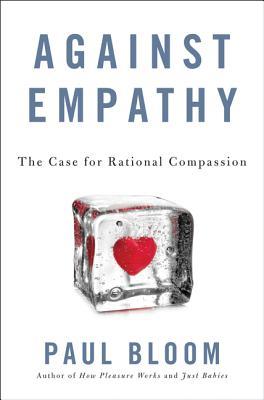Name: Against Empathy, The Case for Rational Compassion
Author: Paul Bloom
Publisher: HarperCollins
Amazon rating: 3.6 stars
Twitter: @paulbloomatyale
“The act of feeling what you think others are feeling is different from being compassionate, from being kind, and most of all, from being good. From a moral standpoint, we’re better off without it.”
Paul Bloom thinks of empathy as a sugary soda, tempting and delicious, but ultimately bad for us. Throughout Against Empathy’s six chapters and two interludes, he proposes the use of conscious, deliberate reasoning instead.
The book is Bloom’s fifth, and a follow up to 2013’s Just Babies: The Origins of Good and Evil. As with previous works, the Canadian American professor explores the human condition with a lighthearted tone and broad range of anecdotal evidence, quoting everyone from The Joker to Mother Teresa.
He begins with an overview of empathy, especially the bias and self interest involved in putting oneself in another’s shoes. We are inherently emotional creatures, but our ability to overrule our emotions means rationality should come just as easily.
Bloom’s background in cognitive science is apparent in the neuroscientific explanations he gives for empathetic reactions. This allows for fascinating insights into the minds of those who process empathy differently, including autistic people.
Against Empathy remains digestible to more casual readers too, with Bloom continually challenging our reductive understandings. He poses moral dilemmas and examples of biased or misguided empathy- often to comic effect.
One such case is the aftermath of the 2012 Sandy Hook shootings, when a warehouse had to be rented to house the plush toys sent by empathetic people! A similar case is the money donated to the Make a Wish foundation, and how money spent upon each wish could instead save the lives of three African children.
The author discusses empathy’s adverse effects upon political leanings, intimacy, morality and personal relationships. His most compelling condemnation is the argument that it creates violence and cruelty, that World War 2 and ISIS are amongst empathy’s results.
If you don’t lose interest halfway through (it gets a little repetitive), Bloom makes it worth your while to stick around for the final chapter. Here he details several ‘mind bugs’ and bizarre cases to make you question your knowledge of the brain and its functions.
Through his writing abilities, Bloom could indefinitely succeed in convincing his greatest sceptic about the dangers of empathy. I’d recommend the book to all readers, but particularly those in managerial or HR positions, who must regularly make decisions based upon their rationality or empathy.
Bloom’s discussion may help one realise that they use heart over head in work related matters. His case studies suggest ways to subvert these tendencies as well.
Against Empathy is a necessary text for our era at large too, as rationality is more important than ever. Its publication coincides with the rise of fake news and right wing movements’ calls to empathise with hegemonic groups.












